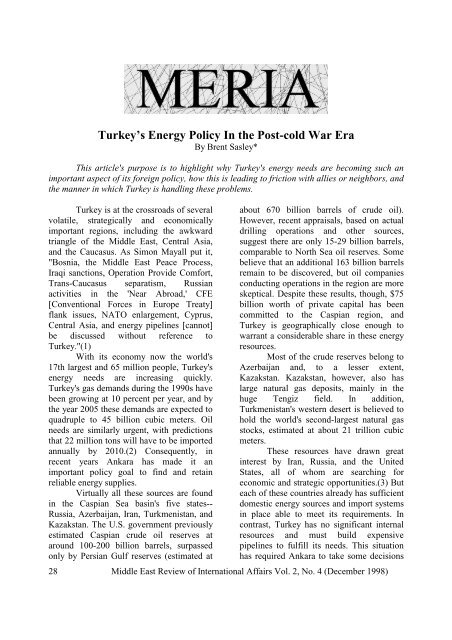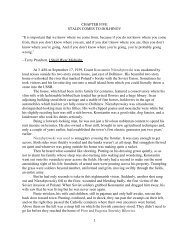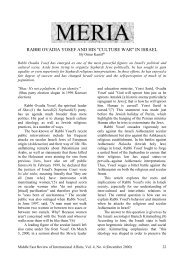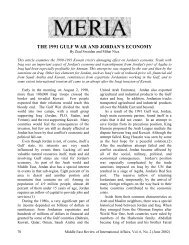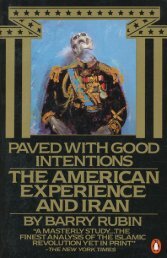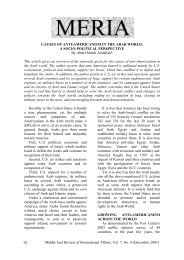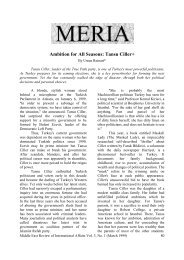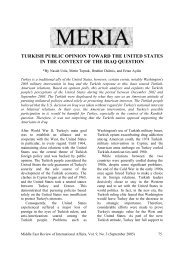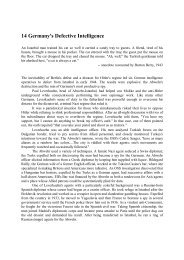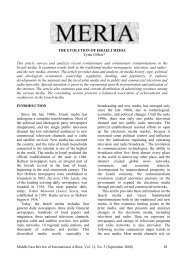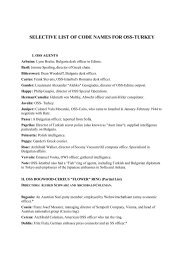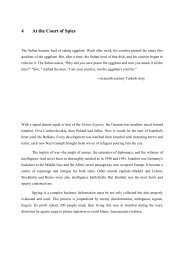Turkey's Energy Policy In the Post-cold War Era - GLORIA Center
Turkey's Energy Policy In the Post-cold War Era - GLORIA Center
Turkey's Energy Policy In the Post-cold War Era - GLORIA Center
You also want an ePaper? Increase the reach of your titles
YUMPU automatically turns print PDFs into web optimized ePapers that Google loves.
Turkey’s <strong>Energy</strong> <strong>Policy</strong> <strong>In</strong> <strong>the</strong> <strong>Post</strong>-<strong>cold</strong> <strong>War</strong> <strong>Era</strong><br />
By Brent Sasley*<br />
This article's purpose is to highlight why <strong>Turkey's</strong> energy needs are becoming such an<br />
important aspect of its foreign policy, how this is leading to friction with allies or neighbors, and<br />
<strong>the</strong> manner in which Turkey is handling <strong>the</strong>se problems.<br />
Turkey is at <strong>the</strong> crossroads of several<br />
volatile, strategically and economically<br />
important regions, including <strong>the</strong> awkward<br />
triangle of <strong>the</strong> Middle East, Central Asia,<br />
and <strong>the</strong> Caucasus. As Simon Mayall put it,<br />
"Bosnia, <strong>the</strong> Middle East Peace Process,<br />
Iraqi sanctions, Operation Provide Comfort,<br />
Trans-Caucasus separatism, Russian<br />
activities in <strong>the</strong> 'Near Abroad,' CFE<br />
[Conventional Forces in Europe Treaty]<br />
flank issues, NATO enlargement, Cyprus,<br />
Central Asia, and energy pipelines [cannot]<br />
be discussed without reference to<br />
Turkey."(1)<br />
With its economy now <strong>the</strong> world's<br />
17th largest and 65 million people, <strong>Turkey's</strong><br />
energy needs are increasing quickly.<br />
<strong>Turkey's</strong> gas demands during <strong>the</strong> 1990s have<br />
been growing at 10 percent per year, and by<br />
<strong>the</strong> year 2005 <strong>the</strong>se demands are expected to<br />
quadruple to 45 billion cubic meters. Oil<br />
needs are similarly urgent, with predictions<br />
that 22 million tons will have to be imported<br />
annually by 2010.(2) Consequently, in<br />
recent years Ankara has made it an<br />
important policy goal to find and retain<br />
reliable energy supplies.<br />
Virtually all <strong>the</strong>se sources are found<br />
in <strong>the</strong> Caspian Sea basin's five states--<br />
Russia, Azerbaijan, Iran, Turkmenistan, and<br />
Kazakstan. The U.S. government previously<br />
estimated Caspian crude oil reserves at<br />
around 100-200 billion barrels, surpassed<br />
only by Persian Gulf reserves (estimated at<br />
about 670 billion barrels of crude oil).<br />
However, recent appraisals, based on actual<br />
drilling operations and o<strong>the</strong>r sources,<br />
suggest <strong>the</strong>re are only 15-29 billion barrels,<br />
comparable to North Sea oil reserves. Some<br />
believe that an additional 163 billion barrels<br />
remain to be discovered, but oil companies<br />
conducting operations in <strong>the</strong> region are more<br />
skeptical. Despite <strong>the</strong>se results, though, $75<br />
billion worth of private capital has been<br />
committed to <strong>the</strong> Caspian region, and<br />
Turkey is geographically close enough to<br />
warrant a considerable share in <strong>the</strong>se energy<br />
resources.<br />
Most of <strong>the</strong> crude reserves belong to<br />
Azerbaijan and, to a lesser extent,<br />
Kazakstan. Kazakstan, however, also has<br />
large natural gas deposits, mainly in <strong>the</strong><br />
huge Tengiz field. <strong>In</strong> addition,<br />
Turkmenistan's western desert is believed to<br />
hold <strong>the</strong> world's second-largest natural gas<br />
stocks, estimated at about 21 trillion cubic<br />
meters.<br />
These resources have drawn great<br />
interest by Iran, Russia, and <strong>the</strong> United<br />
States, all of whom are searching for<br />
economic and strategic opportunities.(3) But<br />
each of <strong>the</strong>se countries already has sufficient<br />
domestic energy sources and import systems<br />
in place able to meet its requirements. <strong>In</strong><br />
contrast, Turkey has no significant internal<br />
resources and must build expensive<br />
pipelines to fulfill its needs. This situation<br />
has required Ankara to take some decisions<br />
28 Middle East Review of <strong>In</strong>ternational Affairs Vol. 2, No. 4 (December 1998)
contrary to <strong>the</strong>se o<strong>the</strong>r powers' policies and<br />
interests.<br />
STRIKING OUT ON ITS OWN<br />
While Turkey remains very friendly<br />
to <strong>the</strong> United States, Ankara has had to cast<br />
a wider net in its search for means to supply<br />
its energy needs than Washington has<br />
preferred, especially regarding business<br />
dealings with Iran. These circumvent <strong>the</strong><br />
1996 Iran-Libya Sanctions Act, which<br />
punishes companies investing more than $20<br />
million in ei<strong>the</strong>r country.<br />
To sustain its current economic<br />
growth, Turkey in 1996 signed a deal with<br />
Iran to purchase $23 billion worth of gas<br />
over <strong>the</strong> next 23 years, making that country<br />
<strong>Turkey's</strong> second-largest gas supplier.(4) A<br />
pipeline is scheduled to begin operating in<br />
mid-1999. This is in conflict with U.S.<br />
policy to avoid bringing Iran into any of <strong>the</strong><br />
region's emerging commodity and economic<br />
web of agreements.<br />
To supplement this arrangement,<br />
Turkey in December 1997 completed an<br />
agreement with Turkmenistan and Iran to<br />
build a pipeline through <strong>the</strong> former to<br />
connect with <strong>the</strong> Turkey-Iran pipeline.<br />
Construction began on November 9 1998,<br />
and <strong>the</strong> line is scheduled to begin piping gas<br />
in 2001. The signatories to this accord also<br />
hope that eventually Turkmen gas can be<br />
routed through this conduit to Europe, which<br />
would of course increase <strong>the</strong> transit fees<br />
collected by <strong>the</strong>se states.<br />
<strong>In</strong> addition, <strong>Turkey's</strong> preference for<br />
an oil pipeline crossing Turkey ra<strong>the</strong>r than<br />
Russia has annoyed Moscow. Russia has<br />
traditionally been <strong>Turkey's</strong> largest gas<br />
supplier. Given its need to meet growing<br />
internal consumption, Ankara has sought to<br />
increase <strong>the</strong>se quantities significantly.<br />
Moscow promised to augment its supplies<br />
fivefold by 2010 and to build a gas pipeline<br />
reaching under <strong>the</strong> Caspian Sea to Turkey.<br />
However, it is unlikely that cash-strapped<br />
Turkey’s <strong>Energy</strong> Politics in <strong>the</strong> <strong>Post</strong>-Cold <strong>War</strong> <strong>Era</strong><br />
Russia will be able to meet <strong>the</strong>se demands or<br />
keep <strong>the</strong>se promises. With its primary<br />
supplier unable to meet its needs, Turkey<br />
has been forced to look elsewhere for<br />
sources.<br />
Since achieving independence from<br />
<strong>the</strong> USSR in late 1991, Azerbaijan has been<br />
<strong>the</strong> focal point of intense governmental and<br />
corporate interest in its oil reserves. Unable<br />
to develop its offshore oil fields with only<br />
Russian technology, Azerbaijan welcomed<br />
Western oil companies to drill for oil and<br />
help export it, and Western governments to<br />
provide protection from Russian<br />
domination. Drilling and extracting <strong>the</strong> oil is<br />
relatively easy compared to arranging for its<br />
export. This also involves highly political<br />
decisions about transport routes, which most<br />
of those involved view as a zero-sum game.<br />
The issues of oil transport pipelines<br />
have been in negotiation since 1993. <strong>In</strong><br />
1994, <strong>the</strong> Azerbaijani government signed<br />
what was called <strong>the</strong> "contract of <strong>the</strong> century"<br />
with <strong>the</strong> Azerbaijan <strong>In</strong>ternational Operating<br />
Company (AIOC), a business consortium of<br />
oil companies from <strong>the</strong> United States,<br />
Britain, Norway, Turkey, Russia, Japan,<br />
Saudi Arabia, and Azerbaijan itself. The<br />
accord allows <strong>the</strong>se companies to drill in<br />
three major fields (<strong>the</strong> Azeri, Chiraq, and<br />
Guneshli) and involves some $7.4 billion.<br />
These firms, a mixture of private and public<br />
ventures, are to pay for whatever pipeline is<br />
eventually built to transport Azeri oil to<br />
outside markets.<br />
Although <strong>the</strong> final decision rests<br />
with Baku (or, perhaps more appropriately,<br />
with President Heidar Aliyev, <strong>the</strong> strongman<br />
who rules Azerbaijan with a mantle of<br />
democracy), <strong>the</strong> AIOC is to recommend to<br />
<strong>the</strong> Azeri government which pipeline route it<br />
deems most economically sound. Since <strong>the</strong><br />
consortium is paying for <strong>the</strong> pipeline's cost,<br />
it is expected that its proposals will be<br />
treated quite seriously. The AIOC's report<br />
has been postponed several times, <strong>the</strong> most<br />
recent being from October 29, to mid-<br />
Middle East Review of <strong>In</strong>ternational Affairs Vol. 2, No. 4 (December 1998) 29
Brent Sasley<br />
November, and finally to early December,<br />
1998. <strong>In</strong> fact, it is unlikely <strong>the</strong> AIOC will<br />
make suggestions at any time soon.<br />
The consortium had originally<br />
planned to use an older Soviet-made<br />
pipeline stretching from Baku, through<br />
Chechnya, to <strong>the</strong> Russian port of<br />
Novorossiisk on <strong>the</strong> Black Sea. The oil<br />
would <strong>the</strong>n, it was expected, be shipped<br />
through <strong>the</strong> Turkish Straits and into <strong>the</strong><br />
Mediterranean Sea. However, Ankara has<br />
from <strong>the</strong> start strenuously objected to this<br />
proposal: aside from its desire not to miss<br />
out on any lucrative transit fees that would<br />
come with having an oil pipeline traverse its<br />
territory, Turkish policymakers have pointed<br />
out that <strong>the</strong> Turkish Straits, <strong>the</strong> Bosphorus<br />
channel in particular, is simply unable to<br />
handle any more oil traffic.<br />
Therefore, ano<strong>the</strong>r route would be<br />
more feasible. Although <strong>the</strong> United States<br />
supports <strong>Turkey's</strong> claim to <strong>the</strong> Main Export<br />
Pipeline, as it is called, Ankara has risked<br />
<strong>the</strong> displeasure of both Russia and Iran by<br />
calling for <strong>the</strong> Baku-Ceyhan line to be<br />
constructed as <strong>the</strong> primary export vehicle of<br />
Azerbaijani oil. <strong>In</strong> doing so, Turkey has<br />
challenged Russia in what Moscow prefers<br />
would remain its own backyard, <strong>the</strong> "Near<br />
Abroad," namely Central Asia and <strong>the</strong><br />
Caucasus. Although <strong>the</strong> challenge is<br />
primarily economic, Moscow must take into<br />
account <strong>the</strong> development of a Turkish sphere<br />
of influence displacing Russia on security<br />
and political matters.<br />
WHOSE OIL; WHOSE PIPELINE?<br />
A fur<strong>the</strong>r complication is <strong>the</strong><br />
disagreement by <strong>the</strong> locals states as to how<br />
to divide ownership of Caspian Sea energy<br />
reserves. The five littoral states are not<br />
unanimous in <strong>the</strong>ir views, with some<br />
preferring <strong>the</strong> Caspian's legal status to be<br />
titled a "lake," and o<strong>the</strong>rs favoring a "sea"<br />
approach. The division of <strong>the</strong> oil spoils<br />
would vary accordingly.<br />
If <strong>the</strong> Caspian is defined as a sea,<br />
under <strong>the</strong> 1982 UN Convention on <strong>the</strong> Law<br />
of <strong>the</strong> Sea, littoral states can claim rights of<br />
sovereign waters up to twelve miles from<br />
shore and an exclusive economic zone<br />
within 200 miles from <strong>the</strong> coast.(5) If <strong>the</strong><br />
Caspian is granted lake status, tradition and<br />
precedent sanction that surrounding<br />
countries divide <strong>the</strong> water's resources<br />
equally between <strong>the</strong>m.<br />
Azerbaijan and Kazakstan say <strong>the</strong><br />
Caspian is a sea, which would allow both<br />
countries to retain <strong>the</strong>ir resource-rich areas<br />
without having to share <strong>the</strong>m with <strong>the</strong> o<strong>the</strong>r<br />
states. Russia, whose offshore reserves are<br />
far less than those of Azerbaijan and<br />
Kazakstan, claims <strong>the</strong> Caspian is a lake so<br />
that it can gain a larger share of <strong>the</strong><br />
resources. Iran is somewhat supportive of<br />
Moscow's position, arguing that no<br />
economic exploitation should take place<br />
until all five states agree on a proper<br />
division of <strong>the</strong> Caspian's munificence.<br />
Turkmenistan, for its part, has taken both<br />
stands at times without a clear indication of<br />
any particularly strongly held viewpoint.<br />
<strong>Turkey's</strong> support for Azerbaijan<br />
derives from <strong>the</strong>ir common interests on this<br />
issue, as well as cultural, linguistic, ethnic,<br />
and historical ties that exist between <strong>the</strong> two<br />
Turkic peoples. However, <strong>the</strong> more<br />
immediate motivation is <strong>the</strong> fact that Aliyev<br />
has shown himself determined to throw off<br />
Russian domination and even influence, and<br />
steer his country toward <strong>the</strong> West,<br />
particularly <strong>the</strong> United States. Turkey is<br />
Washington's nearest regional ally and a<br />
counterbalance to Russia. Aliyev has,<br />
<strong>the</strong>refore, intensified Azerbaijan's<br />
relationship with Turkey to an extent<br />
unexpected when he first came to power.<br />
Azerbaijan has reciprocated by supporting<br />
Ankara's preferred pipeline route.<br />
30<br />
Middle East Review of <strong>In</strong>ternational Affairs Vol. 2, No. 4 (December 1998)
Turkey objected to <strong>the</strong> AIOC's initial<br />
indications that it preferred a Baku-<br />
Novorossiisk pipeline route. Given that a<br />
Turkish company does own a small stake in<br />
<strong>the</strong> AIOC (Turkish Petroleum, at 6.75%),<br />
and Azerbaijan's support for <strong>Turkey's</strong> case,<br />
<strong>the</strong> AIOC agreed to consider o<strong>the</strong>r options.<br />
The two most prominent choices are a<br />
refurbished line running from Baku to <strong>the</strong><br />
Georgian Black Sea port of Supsa (oil<br />
running along this route would also have to<br />
be shipped through <strong>the</strong> Bosphorus), and a<br />
1,081 kilometer connective line from Baku<br />
to <strong>the</strong> Turkish Mediterranean terminal at<br />
Ceyhan.<br />
Turkey has actively, even<br />
aggressively, campaigned for <strong>the</strong> Baku-<br />
Ceyhan pipeline. It has fostered better<br />
relations with Azerbaijan, Turkmenistan,<br />
Georgia, and <strong>the</strong> oil companies making <strong>the</strong><br />
decision on <strong>the</strong> route. Toward <strong>the</strong> end of<br />
1997, <strong>the</strong> first Azerbaijani oil was piped<br />
through to Novorossiisk, and since <strong>the</strong>n<br />
Turkey has increased <strong>the</strong> pitch of its<br />
lobbying. The main components of <strong>Turkey's</strong><br />
argument include: Ceyhan's ability to handle<br />
large amounts of oil, <strong>the</strong> fact that due to<br />
environmental and ecological reasons <strong>the</strong><br />
Bosphorus cannot manage more oil traffic,<br />
and playing on <strong>the</strong> U.S. desire to keep<br />
Russia and Iran from any significant control<br />
or benefit from oil transport routes.<br />
The Ceyhan terminal, near <strong>the</strong> Syrian<br />
border, was once part of <strong>the</strong> pipeline<br />
network bringing Iraqi oil to <strong>the</strong><br />
Mediterranean Sea. It is in good working<br />
condition and, as Turkish politicians are<br />
quick to mention, can handle many times <strong>the</strong><br />
capacity of Novorossiisk. <strong>In</strong> addition, and<br />
perhaps even more important, Ceyhan is on<br />
<strong>the</strong> warm waters of <strong>the</strong> Mediterranean,<br />
whose mild climate allows year-round<br />
operation. Novorossiisk, on <strong>the</strong> o<strong>the</strong>r hand,<br />
is located on <strong>the</strong> Black Sea, where winter<br />
wea<strong>the</strong>r conditions force its closure for part<br />
of <strong>the</strong> year.(6)<br />
Turkey’s <strong>Energy</strong> Politics in <strong>the</strong> <strong>Post</strong>-Cold <strong>War</strong> <strong>Era</strong><br />
<strong>In</strong> addition to <strong>the</strong> benefits of using<br />
Ceyhan, Turkey has also pointed out <strong>the</strong><br />
disadvantages of continuing to use <strong>the</strong><br />
Bosphorus channel as a primary oil-shipping<br />
route. <strong>In</strong> fact, in recent months Turkey has<br />
intensified its negative picture on this point<br />
as a way to undermine <strong>the</strong> arguments of<br />
those who want oil piped to Black Sea ports<br />
and <strong>the</strong>n through <strong>the</strong> Turkish Straits.<br />
The Bosphorus flows through <strong>the</strong><br />
heart of <strong>Turkey's</strong> main city, Istanbul, with its<br />
population of over 10 million people,<br />
presenting a potential ecological nightmare<br />
in <strong>the</strong> case of spills or collisions. As<br />
<strong>Turkey's</strong> Environment Minister, Imren<br />
Aykut, stated, "No country has <strong>the</strong> right to<br />
endanger <strong>the</strong> lives of 10 million people just<br />
because it wants to sell oil."(8)<br />
The Bosphorus is one of <strong>the</strong> most<br />
difficult channels to navigate: its twists<br />
include four separate bends requiring vessels<br />
to turn at more than a 45 degree angle, and<br />
12 times ships must change course as <strong>the</strong>y<br />
wend <strong>the</strong>ir way through <strong>the</strong> passage.<br />
Moreover, <strong>the</strong> channel is already clogged<br />
with ships of all shapes and sizes, including<br />
ferries connecting <strong>the</strong> two parts of <strong>the</strong> city.<br />
An estimated 50,000 vessels passed through<br />
<strong>the</strong> Bosphorus last year, 4500 of which were<br />
tankers, and this number is increasing at a<br />
rate of 15 to 20 percent each year.(7) The<br />
number of foreign ships in <strong>the</strong> passage has<br />
increased since 1960 by 150%, and <strong>the</strong>ir<br />
tonnage by over 400%.<br />
A few examples illustrate <strong>the</strong><br />
hazards posed by <strong>the</strong> Bosphorus:<br />
Between 1983 and 1993, 167 large-scale<br />
accidents occurred in <strong>the</strong> Straits. A 1979<br />
collision between a Greek and Romanian<br />
tanker spilled over 95,500 tons of oil into<br />
<strong>the</strong> water; in 1991, a Lebanese vessel struck<br />
a bridge and sank with 20,000 live sheep. <strong>In</strong><br />
late August 1998 a Greek tanker ran<br />
aground, and on October 23, 1998 a Turkish<br />
oil tanker collided with a water tanker,<br />
although no oil was spilled. These problems<br />
demonstrate <strong>the</strong> dangers posed by over-use<br />
Middle East Review of <strong>In</strong>ternational Affairs Vol. 2, No. 4 (December 1998) 31
Brent Sasley<br />
of <strong>the</strong> Bosphorus by larger vessels carrying<br />
hazardous cargo.<br />
Frustrated by a lack of understanding<br />
from those states using <strong>the</strong> Bosphorus,<br />
Turkey has unilaterally adjusted <strong>the</strong><br />
shipping rules <strong>the</strong>re, which Russia claims<br />
violates <strong>the</strong> 1936 Montreux Convention.(9)<br />
This document has governed <strong>the</strong> conditions<br />
and use of <strong>the</strong> Turkish Straits and has not<br />
been revised to make allowance for changes<br />
since <strong>the</strong>n. It grants free passage through <strong>the</strong><br />
Straits to any ships of any state, regardless<br />
of what cargo is carried. <strong>In</strong> 1994, Turkey<br />
enacted regulations that let it limit traffic<br />
through <strong>the</strong> Bosphorus to prevent<br />
environmental disasters, arguing that it has<br />
<strong>the</strong> right to issue safety and environmental<br />
ordinances for maritime traffic.<br />
Ankara has resorted to veiled threats<br />
as well. Using <strong>the</strong> excuse of <strong>the</strong> dangerous<br />
over-crowding of <strong>the</strong> Bosphorus to force<br />
changes to <strong>the</strong> rules governing its use,<br />
Turkey has attempted to provide such<br />
unfavorable circumstances for those ships<br />
plying <strong>the</strong> Straits that <strong>the</strong> AIOC might<br />
consider it too much trouble and opt instead<br />
for <strong>the</strong> Ceyhan terminus. Foreign Minister<br />
Ismail Cem was most unequivocal in an<br />
October 1998 speech on transporting oil<br />
through <strong>the</strong> Turkish Straits:<br />
"We warn those who are<br />
contemplating such a calculation that <strong>the</strong>y<br />
will face serious difficulties in transporting<br />
not only existing oil shipments but also<br />
future ones through <strong>the</strong> Turkish Straits<br />
starting in <strong>the</strong> year 1999. To this end,<br />
Turkey will start implementing all possible<br />
means afforded by international law as well<br />
as its own legislation....I would suggest that<br />
companies who are in a position to transport<br />
<strong>the</strong>ir Caspian oil ei<strong>the</strong>r via <strong>the</strong> Baku-Ceyhan<br />
pipeline or through <strong>the</strong> Black Sea and <strong>the</strong><br />
Turkish Straits to take <strong>the</strong> above-mentioned<br />
facts into consideration. Turkey has both a<br />
right and <strong>the</strong> determination to take all<br />
necessary measures to protect <strong>the</strong> ecological<br />
system as well as <strong>the</strong> historic and cultural<br />
environment of <strong>the</strong> Turkish Straits."(10)<br />
Some of <strong>the</strong>se measures include:<br />
regulating <strong>the</strong> intensity and flow of tanker<br />
traffic through <strong>the</strong> Bosphorus in light of<br />
potential threats to <strong>the</strong> population and<br />
environment of Istanbul; curtailing increases<br />
in tanker traffic; refusal to give priority to<br />
oil tankers over o<strong>the</strong>r vessels and cargoes;<br />
international legislation which raises<br />
insurance liability of ships to maximum<br />
levels; declaration of hazardous cargoes<br />
(previously voluntary); and, beginning in<br />
2000, authorization given only to doublehulled<br />
tankers.<br />
<strong>In</strong> <strong>the</strong> last few months of 1998,<br />
reports circulated to <strong>the</strong> effect that oil<br />
companies were losing interest in Baku-<br />
Ceyhan, and that a Baku-Supsa line was<br />
more likely to be recommended by <strong>the</strong><br />
AIOC to Azerbaijan. Upon hearing this,<br />
Ankara spoke out forcefully about <strong>the</strong><br />
impossibility of <strong>the</strong> Bosphorus being<br />
jammed with more oil tankers, and that <strong>the</strong><br />
recommendation from <strong>the</strong> AIOC was just<br />
that: a recommendation. As President<br />
Suleyman Demirel put it, in reference to a<br />
Baku-Ceyhan route: "Azerbaijan is<br />
determined, Georgia and Turkey are<br />
determined, and <strong>the</strong> United States is backing<br />
<strong>the</strong> project."(11) President Aliyev has<br />
similarly brushed off concerns that Baku-<br />
Ceyhan is unrealistic. Azerbaijan is meant to<br />
have <strong>the</strong> final say in choosing <strong>the</strong> Main<br />
Export Pipeline, but since <strong>the</strong> consortium<br />
will be shouldering <strong>the</strong> project's costs, one<br />
wonders how independent Aliyev can really<br />
be.<br />
Notwithstanding <strong>the</strong> fact that <strong>the</strong><br />
AIOC has a preference for a Baku-Supsa<br />
line, Turkey has been successful in bringing<br />
o<strong>the</strong>r countries around to its point of view.<br />
As early as December 1997, Aliyev stated<br />
he fully backed plans to use Turkey as a<br />
transit route for Caspian oil.(12) <strong>In</strong> April<br />
1998, <strong>the</strong> presidents of Turkey, Georgia, and<br />
32<br />
Middle East Review of <strong>In</strong>ternational Affairs Vol. 2, No. 4 (December 1998)
Azerbaijan confirmed <strong>the</strong>ir support for <strong>the</strong><br />
Baku-Ceyhan pipeline, and a month later<br />
Aliyev again endorsed this particular route<br />
to <strong>Turkey's</strong> President Demirel. And on<br />
October 19, 1998, on <strong>the</strong> seventy-fifth<br />
anniversary of <strong>the</strong> founding of <strong>the</strong> Republic<br />
of Turkey, <strong>the</strong> presidents of Azerbaijan,<br />
Kazakstan, Turkmenistan, Georgia, and<br />
Turkey signed a declaration of support for<br />
<strong>the</strong> pipeline. At <strong>the</strong> same time, Ankara<br />
announced new incentives for firms building<br />
Baku-Ceyhan, including tax initiatives (a<br />
"tax holiday") and guarantees that transit<br />
fees would only cover costs.<br />
<strong>In</strong> addition to state governments,<br />
Turkey has also been keen on dealing<br />
directly with <strong>the</strong> oil companies considering<br />
<strong>the</strong> Main Export Pipeline. When, toward <strong>the</strong><br />
end of 1998, industry sources indicated that<br />
Baku-Ceyhan was not a viable option,<br />
<strong>Turkey's</strong> energy ministry officials met, on<br />
November 5, with oil firm officials (and<br />
Azeri and Georgian decisionmakers) in<br />
ano<strong>the</strong>r attempt to convince <strong>the</strong> firms that its<br />
own choice was not only more viable, but<br />
economically practical as well.<br />
Finally, Turkey has been able to<br />
count on <strong>the</strong> U.S. policy of bypassing Iran in<br />
<strong>the</strong> hunt for territories through which to<br />
build oil and gas pipelines, and on<br />
Washington's desire to lessen <strong>the</strong> role Russia<br />
plays in <strong>the</strong> region. U.S. interests in <strong>the</strong> area<br />
center on <strong>the</strong> economic potential of both<br />
commodities and markets, and <strong>the</strong> strategic<br />
consequences of secure sources for<br />
industrialized countries and <strong>the</strong> regional<br />
states' development and economic growth.<br />
Washington has committed itself to Baku-<br />
Ceyhan, using Turkey to help protect <strong>the</strong><br />
pipeline and influence <strong>the</strong> Turkic states to<br />
emulate <strong>the</strong> Turkish model of a free-market<br />
economy, democratic polity, and ability to<br />
sustain a healthy secular society in a Muslim<br />
nation.<br />
Strobe Talbott, U.S. Deputy<br />
Secretary of State, was very clear on<br />
Washington's outlook on Caspian energy<br />
Turkey’s <strong>Energy</strong> Politics in <strong>the</strong> <strong>Post</strong>-Cold <strong>War</strong> <strong>Era</strong><br />
politics:<br />
"This administration remains committed to<br />
<strong>the</strong> Caspian Basin <strong>In</strong>itiative and to <strong>the</strong><br />
strategic imperative of developing multiple<br />
transportation routes for bringing oil and gas<br />
to world markets. Let me emphasize in <strong>the</strong><br />
strongest terms that our plans and our policy<br />
continue to feature <strong>the</strong> prospect for a<br />
pipeline running through Baku to Ceyhan.<br />
We will continue to make <strong>the</strong> case for that<br />
pipeline as commercial negotiations among<br />
companies and transit states move forward<br />
in <strong>the</strong> weeks and months ahead."(13)<br />
Former <strong>Energy</strong> Secretary Federico<br />
Pena was even more blunt when he stated<br />
that <strong>the</strong> U.S. wanted "to foster viable and<br />
reliable alternatives for export of <strong>the</strong> region's<br />
resources, particularly avoiding transit<br />
routes through Iran."(14) With <strong>the</strong> Islamic<br />
Republic not being considered a serious host<br />
country, and Washington intent on limiting<br />
Russia's involvement, Turkey is <strong>the</strong> only<br />
viable choice.<br />
<strong>In</strong> May 1998, Turkey hosted <strong>the</strong><br />
"Crossroads of <strong>the</strong> World" Conference,<br />
which brought several American agencies<br />
toge<strong>the</strong>r. The U.S. Export-Import Bank,<br />
Trade and Development Agency, and<br />
Overseas Private <strong>In</strong>vestment Corporation all<br />
agreed to help contribute to making Baku-<br />
Ceyhan a reality, although no agency<br />
committed direct funds to <strong>the</strong> cost of<br />
building it. Although it has not usually been<br />
mentioned, some also believe that American<br />
support for Baku-Ceyhan, aside from<br />
dovetailing with U.S. strategic interests, is a<br />
way of repaying Turkey for <strong>the</strong> economic<br />
hardships it has endured since 1990 and <strong>the</strong><br />
Gulf <strong>War</strong>, including <strong>the</strong> loss of lucrative<br />
transit fees from <strong>the</strong> Iraqi oil pipeline and<br />
<strong>the</strong> disruption of cross-border trade.<br />
Fur<strong>the</strong>rmore, Turkey has been<br />
against Section 907 of <strong>the</strong> American<br />
Congress' Freedom Support Act of 1991,<br />
which was intended to help develop former<br />
Soviet Union countries. Section 907, passed<br />
at <strong>the</strong> behest of a strong Armenian lobby,<br />
Middle East Review of <strong>In</strong>ternational Affairs Vol. 2, No. 4 (December 1998) 33
Brent Sasley<br />
effectively prohibits any U.S. aid to<br />
Azerbaijan so long as <strong>the</strong> latter maintains its<br />
blockade of Nagorno-Karabakh. <strong>In</strong> fact,<br />
Azerbaijan is <strong>the</strong> only country in <strong>the</strong> world<br />
to which <strong>the</strong> United States cannot legally<br />
send humanitarian aid. This legislation<br />
hinders Washington's regional energy<br />
diplomacy, and impedes Azerbaijan's<br />
recovery from <strong>the</strong> war. Turkey would prefer<br />
a repeal, which would help streng<strong>the</strong>n its<br />
allies in Baku.<br />
At <strong>the</strong> same time that Turkey is<br />
gaining support among regional countries<br />
for its preferred pipeline choice, it has also<br />
been quietly increasing its security ties to<br />
certain states. Turkey has replaced Russia as<br />
Georgia's primary trading partner. Given<br />
Tbilisi's desire to wean itself from<br />
dependence on Russia, it can be expected<br />
that <strong>the</strong> two will enhance <strong>the</strong>ir cooperation<br />
even fur<strong>the</strong>r in future. Despite <strong>the</strong> fact that<br />
Ankara did not give unconditional support to<br />
Azerbaijan during its war with Nagorno-<br />
Karabakh, Turkey and Azerbaijan have<br />
much in common and it is not unlikely that<br />
both countries will grow closer as economic<br />
opportunities increase and Baku's need for<br />
Western support and protection grows as<br />
well.<br />
CONCLUSIONS<br />
Unfortunately for Turkey, <strong>the</strong> costs<br />
of constructing a Baku-Ceyhan pipeline are<br />
enormous: <strong>the</strong> Turkish government puts <strong>the</strong><br />
price at $2 billion, while <strong>the</strong> AIOC's<br />
estimates range far higher, at $3.5 billion.<br />
This expense in itself is a significant<br />
deterrent. <strong>In</strong> addition, <strong>the</strong> fact that in March<br />
1998, world oil prices fell to <strong>the</strong>ir lowest<br />
levels in almost a decade means even more<br />
production on <strong>the</strong> world market would make<br />
very little economic sense for those paying<br />
<strong>the</strong> costs of <strong>the</strong> pipeline.<br />
Perhaps just as disturbing for those<br />
supporting <strong>the</strong> Baku-Ceyhan route is <strong>the</strong><br />
slow realization that Washington<br />
dramatically over-estimated <strong>the</strong> potential<br />
reserves hidden beneath <strong>the</strong> Caspian Sea--<br />
although as previously mentioned some do<br />
believe that a considerably higher amount of<br />
reserves does in fact exist. AIOC officials<br />
have stated in <strong>the</strong> past that were <strong>the</strong> volume<br />
of oil to be piped from Azerbaijan to<br />
increase significantly, <strong>the</strong> costs of building<br />
Baku-Ceyhan would be bearable and<br />
economically feasible. Until <strong>the</strong> price of<br />
crude rises, however, and enough oil can be<br />
routed in <strong>Turkey's</strong> preferred direction, <strong>the</strong><br />
costs of this particular pipeline cannot be<br />
justified for those firms participating in <strong>the</strong><br />
energy boom.<br />
<strong>Turkey's</strong> energy requirements are<br />
sufficiently large enough that Ankara has<br />
risked <strong>the</strong> displeasure of o<strong>the</strong>r regional or<br />
external states in its quest for energy<br />
resources. And, in fact, its careful policies<br />
appear to have paid off: Despite using Iran<br />
as a conduit for natural gas, <strong>the</strong> United<br />
States still supports Turkey as <strong>the</strong> terminal<br />
for Azerbaijani and even Kazak oil(15);<br />
despite its desire to have <strong>the</strong> Baku-Ceyhan<br />
pipeline become a reality, and thus avoid<br />
having Iran participate in a lucrative<br />
arrangement, Turkey has managed to<br />
maintain solid and even friendly economic<br />
dealings with Tehran.<br />
Only with Russia has Turkey not<br />
been able to assuage fears of exclusion and<br />
extensive Turkish penetration. Ankara has<br />
on occasion not invited Russia to<br />
international conferences on Caspian<br />
energy, even though many of <strong>the</strong>se<br />
conventions include Central Asian and<br />
Caucasian states. <strong>In</strong> addition, Turkey has<br />
engaged in a relatively active effort to tie <strong>the</strong><br />
newly independent Turkic republics to it, at<br />
least in cultural, educational, and business<br />
matters.<br />
Of course, this is not to say that<br />
Russia and Turkey are on a collision course<br />
over Caspian Sea energy resources; ra<strong>the</strong>r, it<br />
34<br />
Middle East Review of <strong>In</strong>ternational Affairs Vol. 2, No. 4 (December 1998)
Turkey’s <strong>Energy</strong> Politics in <strong>the</strong> <strong>Post</strong>-Cold <strong>War</strong> <strong>Era</strong><br />
is to say that of <strong>the</strong> o<strong>the</strong>r three powers<br />
heavily involved in <strong>the</strong> area, Turkey has not<br />
been able to entangle Russia as sufficiently<br />
as <strong>the</strong> U.S. and Iran in strategic or economic<br />
cooperation, and thus <strong>the</strong> potential for future<br />
strong disagreements over <strong>the</strong>se issues<br />
remain.<br />
The most probable recommendation<br />
from <strong>the</strong> AIOC is a non-recommendation.<br />
Given <strong>the</strong> powerful American and Turkish<br />
support for <strong>the</strong> Baku-Ceyhan line, it is<br />
unlikely <strong>the</strong> consortium would openly<br />
declare that route unfeasible; ra<strong>the</strong>r, most<br />
analysts believe that <strong>the</strong> AIOC will put off a<br />
decision on Baku-Ceyhan and concentrate<br />
instead on <strong>the</strong> Baku-Supsa and Baku-<br />
Novorossiisk routes, with <strong>the</strong> possibility of<br />
expanding one of <strong>the</strong>se to link up to <strong>the</strong><br />
Ceyhan terminal at a later date when <strong>the</strong><br />
volume and price of oil makes such a course<br />
more economically practical. Ankara has not<br />
been pleased with <strong>the</strong>se developments, but it<br />
seems as though <strong>the</strong> AIOC will not be<br />
convinced of <strong>the</strong> workability of <strong>the</strong> Baku-<br />
Ceyhan line until such time as world oil<br />
prices rise and more positive drilling<br />
successes, translating into greater volumes<br />
of oil to be piped, are extracted from <strong>the</strong><br />
Caspian Sea.<br />
Despite <strong>the</strong> fact that Turkey has been<br />
described as an awakening regional power in<br />
many writings, one must also remember that<br />
Ankara has a long history of caution, and<br />
perhaps even timidity, in its foreign policy.<br />
As some have noted, Turkish policymakers<br />
have failed to take advantage of several<br />
historic opportunities due to both <strong>the</strong><br />
Kemalist legacy and <strong>the</strong> fact that Turkey has<br />
always been surrounded by, if not outright<br />
enemies, at least hostile or unfriendly<br />
states.(16)<br />
However, if one is to judge by <strong>the</strong><br />
foreign energy policies Turkey has pursued<br />
in <strong>the</strong> last seven years, one may conclude<br />
that Ankara has decided that, at least on this<br />
matter, it must actively search out and<br />
defend its own interests and not allow<br />
certain opportunities to pass it by. Turkey<br />
has aggressively promoted <strong>the</strong> Baku-Ceyhan<br />
pipeline, going so far as to begin modifying<br />
its policies over <strong>the</strong> use of <strong>the</strong> Bosphorus by<br />
oil tankers. It has risked Washington's<br />
adverse reaction by engaging in gas<br />
agreements with Iran and gambled on being<br />
able to retain a prominent role in regional<br />
energy politics without alienating to any<br />
great degree <strong>the</strong> o<strong>the</strong>r two regional powers<br />
also actively involved in <strong>the</strong> same pursuit,<br />
Russia and Iran.<br />
<strong>Turkey's</strong> plans for acquiring<br />
adequate supplies of energy may seem too<br />
grandiose at times. Ankara's desire to build a<br />
subterranean pipeline under <strong>the</strong> Caspian Sea<br />
stretching from Turkmenistan, through<br />
Azerbaijan and Georgia and finally into<br />
Turkey is one example. However, such a<br />
route would be feasible were <strong>the</strong> financial<br />
inducements commensurate with <strong>the</strong><br />
building costs and <strong>the</strong> need for such a<br />
project to be called for. A pipeline from<br />
Turkmenistan to Turkey would also serve<br />
American interests by bypassing Iran and<br />
Russia altoge<strong>the</strong>r.<br />
As fur<strong>the</strong>r proof of <strong>Turkey's</strong><br />
willingness to do what it must to ensure its<br />
economic and security needs, Ankara<br />
claimed in May 1998 that if <strong>the</strong> Baku-<br />
Ceyhan route is not selected by <strong>the</strong> AIOC, it<br />
might consider hiring a private company to<br />
develop its portion of <strong>the</strong> Baku-Ceyhan<br />
line.(17) Whe<strong>the</strong>r or not this was intended as<br />
a threat or motivation to <strong>the</strong> AIOC remains<br />
to be seen.<br />
<strong>Turkey's</strong> geopolitical locale made<br />
possible an important role in regional<br />
politics, while domestic energy needs<br />
required it to do so. Whe<strong>the</strong>r Russia will be<br />
able to re-dominate <strong>the</strong> region remains to be<br />
seen, but it can be assumed that Turkey will<br />
not accept that fact and intends to continue<br />
playing a major role in Central Asia and <strong>the</strong><br />
Caucasus.<br />
Middle East Review of <strong>In</strong>ternational Affairs Vol. 2, No. 4 (December 1998) 35
Brent Sasley<br />
*Brent Sasley works at <strong>the</strong> Centre for<br />
Defence and Security Studies, University of<br />
Manitoba. His master's <strong>the</strong>sis was, "A<br />
Structural Reinterpretation of Power in <strong>the</strong><br />
Middle East: Explanations and Implications<br />
of <strong>the</strong> Evolving Military Relationship<br />
between Turkey and Israel." He is director<br />
of <strong>the</strong> Editorial Board of <strong>the</strong> Research<br />
<strong>In</strong>stitute of <strong>In</strong>ternational and European<br />
Studies (RIIES).<br />
NOTES<br />
1. Simon Mayall, McNair Paper 56, Turkey:<br />
Thwarted Ambition (Washington, D.C.:<br />
<strong>In</strong>stitute for National Strategic Studies,<br />
1997).<br />
2. Bulent Aras and George Foster, Research<br />
Paper No.43: Turkey and <strong>the</strong> Azerbaijani<br />
Oil Controversies: Looking for a Light at <strong>the</strong><br />
End of <strong>the</strong> Pipeline (A<strong>the</strong>ns: Research<br />
<strong>In</strong>stitute for <strong>In</strong>ternational and European<br />
Studies, 1998), 2.<br />
3. For a comprehensive survey of <strong>the</strong>se<br />
countries' convergence on <strong>the</strong> Caspian, see<br />
Aras and Foster, Turkey and <strong>the</strong> Azerbaijani<br />
Oil Controversies.<br />
4. As this agreement was signed under <strong>the</strong><br />
prime ministership of Islamist Necmettin<br />
Erbakan, who had campaigned for severing<br />
ties with <strong>the</strong> West and streng<strong>the</strong>ning links to<br />
<strong>the</strong> Muslim world, many feared it was a<br />
harbinger of things to come. However, it<br />
should be pointed out that this agreement<br />
had been in negotiation for some time before<br />
Erbakan came to power, and was a reflection<br />
of <strong>Turkey's</strong> energy needs ra<strong>the</strong>r than a sharp<br />
turn in foreign policy.<br />
5. Aras and Foster, Turkey and <strong>the</strong><br />
Azerbaijani Oil Controversies, 4.<br />
6. Ibid., 10.<br />
7. Stephen Kinzer, "Fearless Turks' Big<br />
Fear? Tanker," New York Times 24 October<br />
1998.<br />
8. Ibid.<br />
9. The bulk of oil tanker traffic that passes<br />
from <strong>the</strong> Black Sea through <strong>the</strong> Bosphorus is<br />
Russian.<br />
10. Ismail Cem, press release of unofficial<br />
translation, Turkish Embassy, Washington,<br />
D.C., 24 October 1998; received from<br />
http://www.turkey.org/turkey/f_politics.htm.<br />
11. Reuters, 12 October 1998. Received<br />
from Armenian News Network/Groong, 12<br />
October 1998.<br />
12. Agence France-Presse, via Clarinet, 28<br />
December 1997. Received 29 December<br />
1997.<br />
13. Strobe Talbott, at <strong>the</strong> Washington<br />
<strong>In</strong>stitute for Near East <strong>Policy</strong>'s Turgut Ozal<br />
Memorial Lecture, 14 October 1998.<br />
Received from Armenian News<br />
Network/Groong, 16 October 1998.<br />
14. Testimony of <strong>Energy</strong> Secretary Federico<br />
Pena Before <strong>the</strong> U.S. House of<br />
Representatives Committee on <strong>In</strong>ternational<br />
Relations, 30 April 1998. Received from<br />
Armenian News Network/Groong, 30 April<br />
1998.<br />
15. Although <strong>the</strong>re should be no illusions<br />
about <strong>the</strong> fact that <strong>the</strong> United States has its<br />
own motivations and designs in mind when<br />
it supports <strong>Turkey's</strong> calls for <strong>the</strong> Baku-<br />
Ceyhan route--including avoiding allowing<br />
Russia and Iran to play a large role in<br />
determining <strong>the</strong> economic and strategic<br />
future of Central Asia and <strong>the</strong> Caucasus.<br />
16. See, for instance, Malik Mufti, "Daring<br />
and Caution in Turkish Foreign <strong>Policy</strong>," The<br />
Middle East Journal 52, no.1 (Winter 1998),<br />
especially p.45.<br />
17. Saadet Oruc, "Turkey Considers<br />
Bypassing <strong>the</strong> AIOC," Turkish Daily News<br />
9 May 1998. Received from Armenian<br />
News Network/Groong, 9 May 1998.<br />
36<br />
Middle East Review of <strong>In</strong>ternational Affairs Vol. 2, No. 4 (December 1998)


